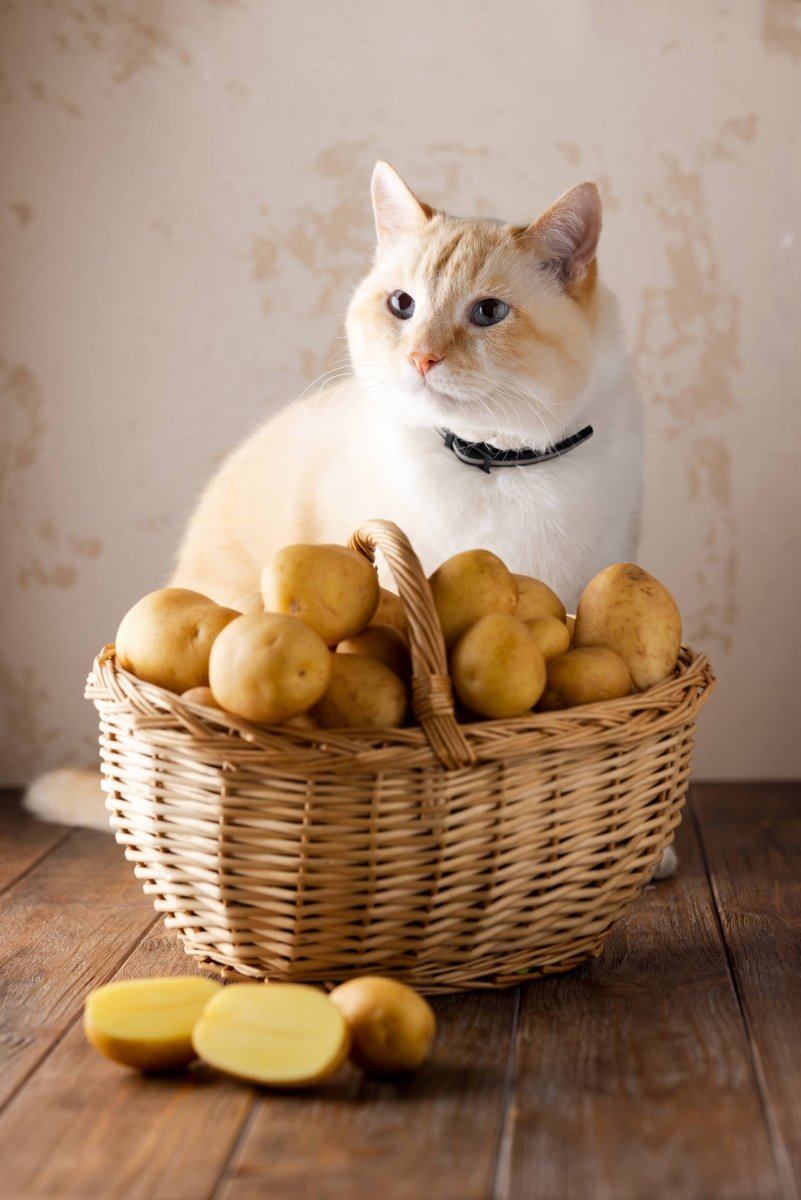Potatoes for cats: healthy alternative or better not?
Potatoes are a staple food in many households. But what about our furry friends? Can cats eat potatoes? The answer is yes, but only under certain conditions. Potatoes can be a healthy addition to their diet if prepared properly and fed in small amounts. In this blog, you'll learn everything you need to know about potatoes for cats—from their health benefits and potential risks to proper preparation.
Can cats eat potatoes? The short answer
Yes, cats can eat potatoes, but only cooked and without seasoning. Raw potatoes, however, are toxic to cats and should be avoided at all costs.
What is allowed?
- Boiled or steamed potatoes without any seasonings or additives.
What is forbidden?
- Raw potatoes, green spots and potato peels.
The benefits of potatoes for cats
Potatoes are rich in nutrients and offer your cat several health benefits in small amounts. Here are the main benefits:
1. Energy source
- Potatoes contain carbohydrates that can provide your cat with energy.
2. Fiber
- Support digestion and promote healthy intestinal flora.
3. Vitamins and minerals
- Vitamin C: Supports the immune system.
- Vitamin B6: Supports the function of the nervous system.
- Potassium: Important for fluid balance and muscle function.
4. Low in calories
- Boiled potatoes are low in fat and can serve as a low-calorie snack.
5. Gluten-free
- Potatoes are gluten-free and suitable for cats with gluten intolerance.
How many potatoes can cats eat?
The right amount is crucial to reap the benefits of potatoes without harming your cat.
Recommended amount:
- Small cats: 1 teaspoon of boiled potatoes per week.
- Medium-sized cats: 1–2 teaspoons per week.
- Large cats: Up to 1 tablespoon per week.
Risks and precautions for potatoes
Potatoes can be healthy, but they also carry some risks. Here are the most important things to keep in mind:
1. Raw potatoes and solanine
- Raw potatoes contain solanine, a toxic substance that is dangerous for cats. Solanine can cause vomiting, diarrhea, and, in severe cases, neurological problems.
2. Green spots and germs
- Green spots and sprouting potatoes contain particularly high levels of solanine and are therefore taboo.
3. Spices and additives
- Salt, butter, milk or spices are unsuitable for cats and can cause digestive problems.
4. Overfeeding
- Too many potatoes can cause flatulence or diarrhea in cats.
5. Allergies
- Some cats may be allergic to potatoes. Watch for symptoms such as itching, vomiting, or diarrhea.
How do you properly feed potatoes to your cat?
To ensure potatoes are healthy and safe for your cat, you should prepare them properly. Here are some tips:
1. Boil or steam potatoes
- Boil the potatoes until tender. Avoid frying or deep-frying.
2. Remove the shell
- The shell can be difficult to digest and should be removed.
3. Cut into small pieces
- Cut the potatoes into bite-sized pieces so your cat can eat them easily.
4. Without spices
- Feed the potatoes plain, without salt, butter or spices.
5. Offer in small quantities
- Start with a small portion to ensure your cat tolerates the potatoes well.
Creative ways to prepare potatoes for cats
Potatoes don't have to be boring. Here are some ideas for offering them to your cat:
1. Cooked potato cubes
- Cut the potatoes into small cubes and serve them as a snack.
2. Mashed potatoes
- Puree cooked potatoes without additives and mix them into your cat's wet food.
3. Homemade cat snacks
- Combine mashed potatoes with tuna and form small balls that you can freeze.
4. Potato and vegetable mix
- Mix cooked potatoes with other cat-friendly vegetables such as zucchini or carrots.
When should you not give your cat potatoes?
There are situations in which potatoes are unsuitable for cats:
1. Diabetes
- Because of the carbohydrates they contain, cats with diabetes should not be given potatoes.
2. Digestive problems
- Cats with sensitive stomachs may react to potatoes with diarrhea or flatulence.
3. Allergies
- If your cat is allergic to potatoes, you should avoid them.
4. Special diets
- Cats with special dietary requirements should only be given potatoes after consulting a veterinarian.
Frequently asked questions about potatoes for cats
“Can kittens eat potatoes?”
Yes, but only in very small quantities and well cooked.
“Are raw potatoes poisonous to cats?”
Yes, raw potatoes contain solanine, which is toxic to cats.
“Can potatoes cause diarrhea?”
Yes, too many potatoes or inappropriate preparation can cause digestive problems.
“What alternatives are there to potatoes?”
Sweet potatoes, pumpkin or zucchini are also suitable vegetable options.
Conclusion: Potatoes for cats – healthy, but with caution
Potatoes can be a healthy and delicious addition to your cat's diet when fed in small amounts and prepared correctly. Key points at a glance:
- Safe: Boiled or steamed potatoes without skin, salt or spices.
- Benefits: Source of energy, rich in fiber and vitamins.
- Caution: No raw potatoes, green spots or potato peels.
With these tips, you can safely and confidently offer potatoes to your cat. Not only are they healthy, but they're also a versatile addition to your cat's diet!



